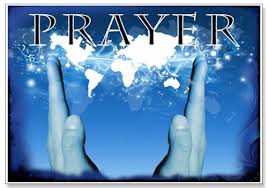Teach me how to pray
 What is prayer?
What is prayer?
Prayer is the one of the ways human beings communicate with God. Prayer usually involves words, although sometimes words cannot be found. God understands the longing of our hearts too and our groans and tears and sighs.
Prayer is deliberately placing ourselves in the presence of God to express what’s on our hearts and to listen to what God wants to convey to us too.
The term ‘Prayer’ comes from the Latin ‘precari’ which translates as ‘to ask earnestly or beg’. There’s a whole lot of emotion there. These are not just empty words.
In religions all over the world, prayer is an invocation, a way to call on a particular god or gods to guide, inspire, forgive, heal, strengthen…It’s the way to activate and develop a relationship with the divine through deliberate communication.
Prayer takes many forms. It can be formal or informal, individual or communal, public or private.
 Why pray?
Why pray?
People pray for all sorts of reasons, sometimes personal and sometimes for others. Prayer is a key component of most world religions. Many people pray to ask God for His help for whatever is going on in their lives, or for His intervention in situations around the world.
How should we pray?
Jesus’ followers knew the importance of prayer. They witnessed him taking himself off to a quiet place on a regular basis to spend time in the presence of God. They knew from their Jewish background that God required communication with His people – a whole tradition of prayer and worship had built up around this requisite.
And now they need to know that they’re doing it right.
One day Jesus was praying in a certain place. When he finished, one of his disciples said to him, ‘Lord, teach us to pray, just as John taught his disciples.’
He said to them, ‘When you pray, say:
‘“Father,
hallowed be your name,
your kingdom come.
Give us each day our daily bread.
Forgive us our sins,
for we also forgive everyone who sins against us.
And lead us not into temptation.”’ Luke 11:1-4
There’s a more extended version of this prayer in Matthew 6, which is the basis of the Lord’s Prayer as we now know it.
 What can we learn from this prayer?
What can we learn from this prayer?
- start with remembering who God is. He is holy. He is God. That’s who we’re praying to. That’s whose presence we’re entering.
- We’re praying for His kingdom and His will to be established in our lives – that things would be done His way rather than our way, rather than the world’s way.
- We’re praying for Him to provide exactly what we need for each day – no more, no less. Not what we want, but what we need.
- We’re praying for our forgiveness – which we can only expect from God if we’re willing to extend forgiveness to those who have hurt us. Jesus makes that very clear. For if you forgive other people when they sin against you, your heavenly Father will also forgive you. But if you do not forgive others their sins, your Father will not forgive your sins. Matthew 6:14-15
- We’re praying that God will lead us on the right path, the path that leads away from temptation and evil and towards light and life and love.
We can use the words of this prayer as a prompt for our own prayers if we want. Generations of people have done so before us. It’s good to come back to this prayer every now and then to remind ourselves of how our prayers should look. This is a balanced prayer. It’s all there.
What else does Jesus teach us about prayer?
- Don’t be a hypocrite and pray just so that other people can see that you’re praying Matthew 6:5
- That applies to fasting too. If you choose not to eat for a period as part of your prayer journey, that’s up to you. It’s between you and God, no one else. No one else needs to know. Matthew 6:16-18
- Find a place to pray where you can be alone and undisturbed Matthew 6:6
- You don’t need to use a lot of words or fancy phrases. God isn’t impressed by any of that. Matthew 6:7
- Don’t be afraid to ask God for whatever you need. And don’t be afraid to keep asking. Luke 11:5-8
- Trust that your prayers will be heard and answered. So I say to you: ask and it will be given to you; seek and you will find; knock and the door will be opened to you. For everyone who asks receives; the one who seeks finds; and to the one who knocks, the door will be opened. Luke 11:9-10
- Trust that God is on your side and wants the best for you, even if you don’t get your prayers answered exactly as you were expecting. Luke 11:11-13
- Don’t be discouraged. Never give up. And will not God bring about justice for his chosen ones, who cry out to him day and night? Will he keep putting them off? Luke 18:7
- Don’t be this person: To some who were confident of their own righteousness and looked down on everyone else, Jesus told this parable…Luke 18:9
- Be this person: But the tax collector stood at a distance. He would not even look up to heaven, but beat his breast and said, “God, have mercy on me, a sinner.” Luke 18:13
 There’s an awful lot to take in here. Prayer is the journey of a lifetime, a developing conversation between an individual and the divine. That can’t be neatly summed up in ten bullet points! Just as each individual is unique, each relationship with God will be unique and each way of doing prayer will be unique.
There’s an awful lot to take in here. Prayer is the journey of a lifetime, a developing conversation between an individual and the divine. That can’t be neatly summed up in ten bullet points! Just as each individual is unique, each relationship with God will be unique and each way of doing prayer will be unique.
Think of prayer as getting to know someone – a pretty special someone! The more time you spend with the other, the easier it will become. You’ll get to know each other’s ways of expressing themselves.
So just start. Or restart. Or continue.
Simply pray.












